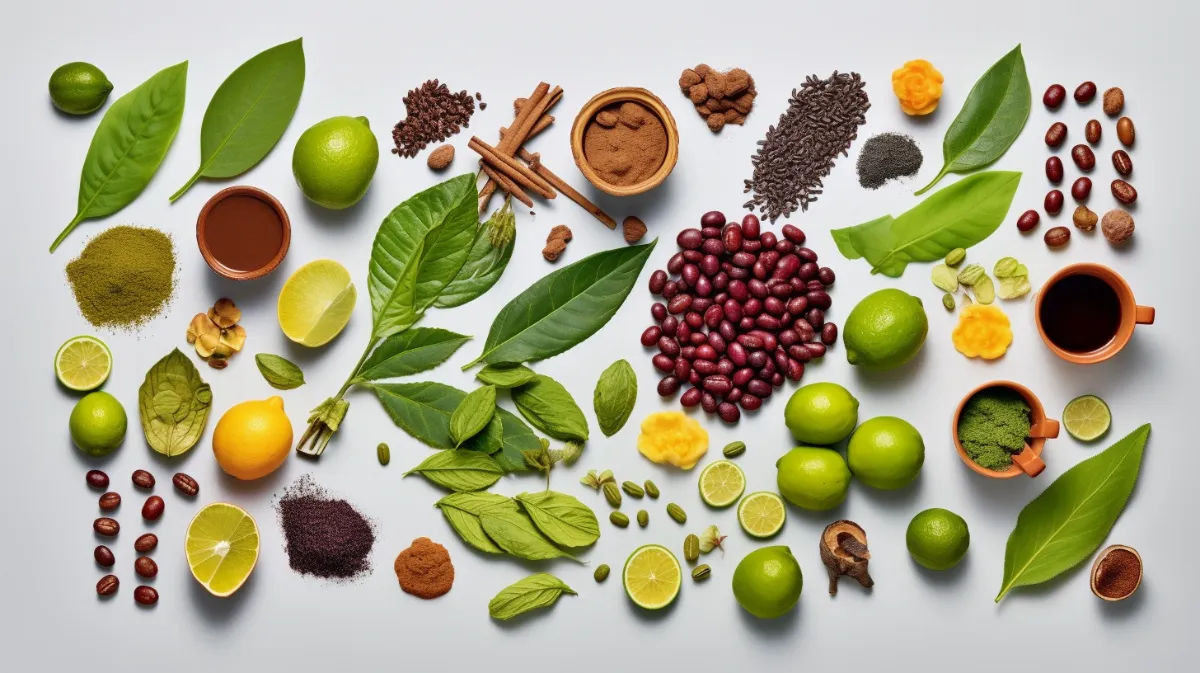It is no coincidence that caffeine is one of the most widely consumed psychoactive substances in the world. Caffeine can be found in numerous forms and products, from coffee to tea, soda to energy drinks, and even chocolate. However, not all sources of caffeine are created equal regarding their potential health benefits.
For those who crave a morning cup of joe or an afternoon pick-me-up, it’s important to consider which forms of caffeine have been shown to provide health benefits beyond simply waking you up. This article will explore some of the healthiest forms of caffeine and what makes them beneficial for our bodies.
By understanding the nuances between different sources of caffeine, we can make more informed decisions about how we consume this powerful substance and potentially improve our overall well-being.
Key Takeaways
- Clean Caffeine Drops offer a convenient and safe source of caffeine without added sugar or calories. For our money, this option takes the cake!
- Moderate caffeine consumption from coffee or green tea can improve cognitive function and physical endurance during exercise.
- Dark chocolate with higher percentages of cocoa solids and fewer added ingredients can be a rich source of flavanols that improve heart health and cognitive function.
- Yerba Mate, a type of tea with numerous health benefits, provides longer lasting energy without jitters or crashes and contains more polyphenols and xanthines than green tea. However, it should be consumed in moderation and potential negative side effects should be considered.
Liquid Caffeine

This discussion delves into the healthiest forms of caffeine, with a focus on Caffeine Anhydrous and Clean Caffeine Drops.
Caffeine anhydrous is a powdered form of caffeine that is commonly used in supplements and energy drinks. It is often considered one of the purest forms available, but its potency can pose potential risks if not consumed responsibly.
On the other hand, clean Caffeine Drops are a liquid form of caffeine that offer convenience and ease of use without compromising purity or safety.
Caffeine Anhydrous
Caffeine anhydrous, a highly concentrated form of caffeine commonly used in dietary supplements and pre-workout products, has been found to have potential health benefits when consumed in moderation. This form of caffeine is made by removing the water content from caffeine extracted from natural sources such as coffee beans or tea leaves. As a result, caffeine anhydrous contains a higher concentration of caffeine compared to other forms of caffeinated beverages.
Benefits and risks associated with consuming caffeine anhydrous should be considered before use. The recommended dosage for this form of caffeine is typically 200-300mg per day, however it can vary depending on factors such as age and weight. Compared to other forms of caffeinated beverages, caffeine anhydrous has a higher risk for overdose due to its high concentration and potency. Side effects associated with excessive consumption include anxiety, tremors, rapid heartbeat, and insomnia. Despite these risks, moderate intake of this form of caffeine has been shown to enhance mental alertness and improve physical performance during exercise.
Moving onto the subsequent section about ‘clean caffeine drops’, it’s important to note that there are various forms of healthy alternatives available for those looking for a cleaner source of energy without the side effects commonly associated with traditional forms like coffee or energy drinks.
Clean Caffeine Drops
Clean caffeine drops are a popular alternative for those seeking a more natural and convenient way to get a boost of energy. These drops typically contain caffeine sourced from green coffee beans, guarana berries, or tea leaves.
Here are some benefits and risks, dosage recommendations, comparing brands, mixing with other supplements, and user reviews that can help you make an informed decision about using clean caffeine drops.
Benefits: Clean caffeine drops provide a quick and efficient source of energy without the added sugar or calories found in many caffeinated beverages. It can also improve mental focus and alertness.
Risks: Overconsumption of caffeine can lead to negative side effects such as jitters, anxiety, insomnia, rapid heart rate, headache, and upset stomach.
Dosage Recommendations: The recommended daily intake of caffeine is 400mg per day for healthy adults. However, the exact dosage may vary depending on individual factors such as weight and sensitivity to caffeine.
Mixing with Other Supplements: Avoid combining clean caffeine drops with other stimulants like ephedrine or synephrine as this could increase the risk of adverse effects.
Moving onto coffee – it’s one of the most widely consumed beverages in the world and is known for its energizing effects due to its high caffeine content.
Coffee

With its long-standing popularity and global consumption, coffee remains a prominent source of caffeine for many individuals seeking a morning boost to their day. Coffee has various benefits that make it an attractive choice as a caffeine source. Research suggests that drinking coffee may reduce the risk of developing type 2 diabetes, Parkinson’s disease, and liver cancer. Different brewing methods also affect the concentration and quality of the caffeine in coffee. For example, cold brew coffee is less acidic than hot brewed coffee and contains more antioxidants.
In addition to its potential health benefits, coffee can also impact mental health and physical performance. Caffeine in moderate amounts has been shown to improve cognitive function, including attention span and reaction time. It can also enhance physical endurance during exercise by reducing perceived exertion levels. However, excessive consumption of caffeine can lead to negative side effects such as anxiety, insomnia, and gastrointestinal issues. For those who prefer alternatives to coffee or are sensitive to its effects, there are other healthy sources of caffeine available such as green tea.
Without explicitly stating ‘step’, let us transition into the subsequent section about green tea by highlighting another option for those seeking a healthier form of caffeine beyond just coffee: “For individuals looking for alternative options or aiming to limit their intake of caffeine from one source alone, green tea is another healthy choice.” ‘Green tea has been shown to provide a range of health benefits, including improved brain function, lower risk of certain diseases, and increased fat burning.’
Green Tea

Green tea is a popular beverage that has been consumed for centuries in various cultures and is known for its potential health benefits.
Green tea contains caffeine, which can improve mental alertness, cognitive function, and physical performance. It also contains a group of polyphenols called catechins, which have antioxidant properties that can reduce the risk of chronic diseases such as heart disease and cancer.
Different varieties of green tea are available, each with their unique taste and aroma. Some popular ones include sencha, matcha, gyokuro, and bancha. The brewing technique can also affect the taste and strength of the tea. For example, steeping green tea at a high temperature or for too long can result in a bitter taste.
Drinking green tea regularly has been associated with several health benefits such as reducing inflammation, improving brain function, promoting weight loss by increasing metabolic rate and fat burning capacity. However excessive consumption may lead to some risks like liver damage due to high intake of catechins.
Green tea’s health effects make it an excellent substitute for other caffeinated beverages like black tea or coffee. In the next section on dark chocolate, we explore another healthy source of caffeine that offers additional benefits beyond just boosting energy levels.
Dark Chocolate

Like a decadent treat, dark chocolate is a rich source of flavanols linked to potential health benefits such as improving heart health and cognitive function. Flavanols are antioxidants found in cocoa beans, which help reduce inflammation and improve blood flow. Dark chocolate with at least 70% cocoa solids is considered the best option for consuming flavanols. Milk chocolate, on the other hand, contains less than 10% cocoa solids and has more added sugar and milk products.
Consuming dark chocolate in moderation can lead to several benefits. Studies have shown that it can lower blood pressure, reduce LDL cholesterol levels, and decrease the risk of heart disease. It may also improve brain function by increasing blood flow and reducing inflammation. When choosing a brand of dark chocolate, it is important to look for those with higher percentages of cocoa solids and fewer added ingredients like sugar or milk products. Incorporating dark chocolate into your diet can be as simple as adding it to smoothies or oatmeal or using it in baking recipes for a guilt-free treat.
Moving on from dark chocolate into yerba mate…
Yerba Mate

Moving on from dark chocolate, let’s explore another healthy source of caffeine – Yerba Mate. While dark chocolate is a tasty and convenient way to get your caffeine fix, Yerba Mate offers a more traditional and cultural experience enjoyed for centuries in South America.
Yerba Mate is a tea made from the dried leaves of the Ilex paraguariensis plant. It is native to South America and has been consumed by indigenous people in countries like Argentina, Uruguay, and Paraguay for hundreds of years. Yerba Mate contains about 30 milligrams of caffeine per cup, less than coffee but more than green tea.
Incorporating this unique source of caffeine into your routine may provide a unique experience that is both healthful and culturally significant. However, as with any caffeinated beverage, it’s important to consume in moderation and be aware of potential negative side effects. Whether enjoyed through traditional methods or modern brewing techniques, Yerba Mate offers a refreshing alternative to coffee or green tea with its own benefits and risks.
Frequently Asked Questions
Can caffeine be harmful to my health?
Caffeine consumption in moderation has been associated with several health benefits, including improved cognitive function and reduced risk of certain diseases. However, excessive caffeine intake may lead to negative effects such as anxiety, insomnia, and addiction. Alternatives to caffeine include herbal teas and decaf coffee. Long-term effects of caffeine are still uncertain. Caffeine addiction can be managed by gradually reducing intake or seeking professional help if necessary.
Is there a recommended daily caffeine intake?
Caffeine recommendations vary depending on factors such as age, weight, and overall health. Sources of caffeine include coffee, tea, energy drinks, and supplements. Alternatives to caffeine include herbal teas and hydration. Caffeine may enhance exercise performance but can negatively affect mental health in some individuals.
What are the effects of caffeine on sleep?
Caffeine has been shown to provide productivity benefits, but it can also cause sleep deprivation. Caffeine tolerance, addiction, and withdrawal are potential concerns, while anxiety and heart health may be impacted by excessive consumption.
Can caffeine help with weight loss?
Caffeine may aid weight loss through its effects on metabolism, appetite suppression, increased physical performance, and mental focus. However, caffeine’s diuretic effect can hinder hydration levels. Evidence suggests that moderation is key for optimal results.
Are there any negative side effects of consuming too much caffeine?
Excessive caffeine consumption can lead to caffeine tolerance, addiction, and withdrawal symptoms. It may also exacerbate anxiety and negatively impact heart health. An evidence-based approach is necessary for informed decision-making regarding caffeine intake.



